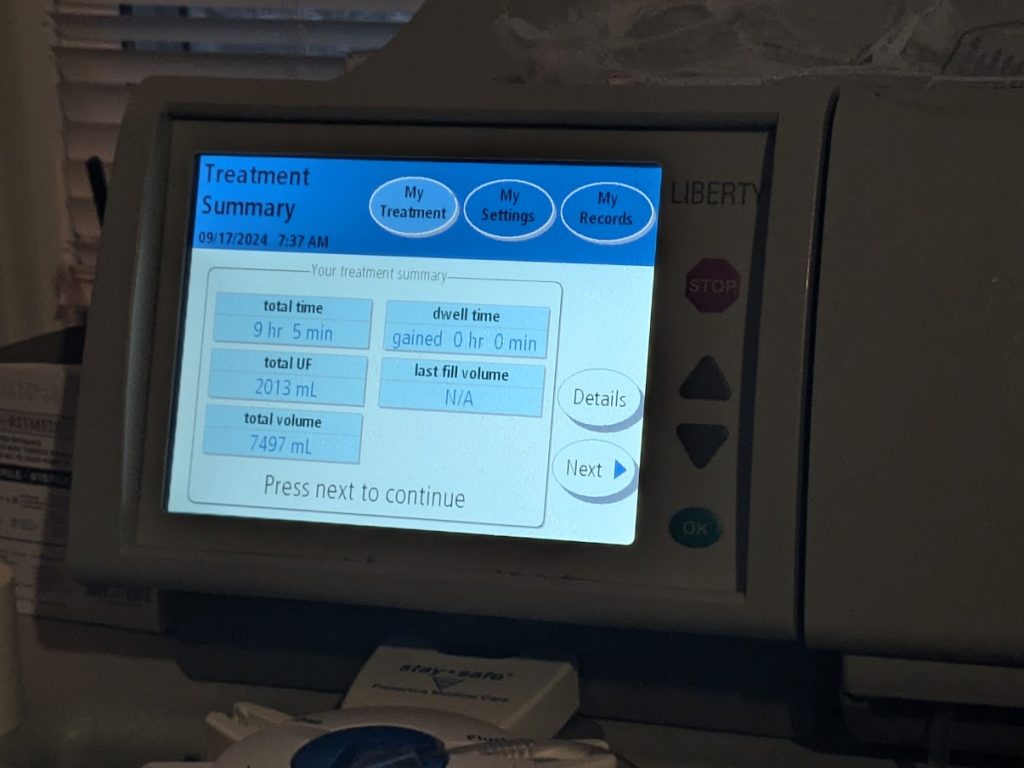Life on peritoneal dialysis means a major time commitment. As you can see in the image, in a good night, it will take about 9 hours. But it often takes 9 1/2 or 10 hours or more and it has to happen seven days a week. It’s hard to tell the reason, but it means you don’t have the same free time normal people have. You can’t just go hang out late with friends without planning it ahead of time and being ready to get connected and get to bed at night.
You also have to add in your prep time. When I get home from work I have to take the used supplies out to the trash. The supplies come in cardboard cartons that you empty pretty quickly. As I empty them I put them in the back seat of my car and two or three times a week I have to go to the convenience center and dump a car full of boxes.
Getting ready for dialysis starts with cleaning down the machine surface with bleach wipes. Then I have to wash my hands and set up the machine, which takes about 15 minutes. During the process I have to soak my catheter in sanitizer, which will bleach your clothes. Then the process starts. In the morning I have to take my shower and then dry off the bandage on my catheter entry site. After that I have to remove the bandage, inspect the site to make sure there are no signs of infection. If I’m satisfied with that I wipe my entry site with two disinfectant wipes, and then dry it with two dry wipes. I put a dab of antibiotic ointment over the entry site followed by a small bandage and then I cover it with a fresh large bandage. Then I have to weigh myself, take down my blood pressure and my Ultrafiltration number from the machine, which shows how much extra fluid and toxins drain from your body due to the dialysis. As you see in the picture above, that night I had 2013 mL of fluid drain. That’s 2 liters of toxins and water draining from my body.
The whole morning process takes about 20 minutes, but I have to also wake up an hour early to stop the Dialysis early so it will finish in time to get ready for work. So I’m losing an hour of sleep every night but Friday. Keep in mind I work 8 hours a day plus a 1 hour lunch break and work is about 35-40 minutes from home. That’s 9 hours at work, plus about an hour of getting ready and driving to work and an hour to get home if I stop somewhere on the way home. Essentially during the week I have an 11 hour workday and 10 hours on dialysis. Which leaves me 3 hours to entertain myself during the week. I have a little more freedom on Friday night because I don’t have to wake up early on Saturday, but then I have to get up for church so I can’t stay off too late on Saturday night.
As I said, it’s a huge time commitment. The positive is I don’t really feel sick and the treatment is painless. I get to see a nephrologist and if anything changes with my health my doctors and dialysis nurses see my monthly and can adjust my medicines to keep me going strong. This whole time thing is why I need a kidney transplant. It would give me a better quality of life with not having to be connected to a machine for 9-10 hours every day. This is why my search for a living donor continues. And I haven’t even mentioned some of the mental commitments you have to make.
You have to avoid cutting corners because all the procedures you have are designed to keep you from getting an infection. You have to always be aware of your dialysis. If you are going to be out late, you have to be ready to scramble to set up for dialysis and get in bed quick. If you stay up late watching tv and fall asleep on the couch, you have to wake up and go set up and get in bed. If you go on a trip you have to make sure you take your machine and all your supplies. I’ve had two trips where I forget some of my supplies. On the first one I was lucky. The dialysis clinic had a location in the town I was in that was open and they gave me a bottle of disinfectant. The second trip almost killed me I feel. There was nowhere nearby that had a dialysis clinic for my kidney clinic company. I had to try to watch my diet and limit my fluid intake until the trip was over. By the time I got home I had several pounds of fluid on my legs and in my chest and I could barely breath with any level of walking. That taught me to know ahead of time if the kidney clinic is located where I’m traveling and double check my supplies before I leave. Also that those clinics are only open during bankers hours.
It’s a big commitment. But well worth it to feel somewhat normal with kidney that barely work. Help me out if you can. If you think you may want to donate a kidney, even if we don’t match, your donated kidney to another recipient helps. It would remove one person that’s ahead of me in the waiting list. But also, there is a thing where donor pairs can be matched. So if someone else has a potential donor that matches me, but not them, and you match that person but not me, we can swap donors so we both get a kidney.
Thanks for taking the time to read this and God bless!



